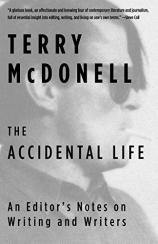The Accidental Life: An Editor's Notes on Writing and Writers
Review
The Accidental Life: An Editor's Notes on Writing and Writers
In a career that has spanned 40 years, including stints as managing editor or editor-in-chief at Rolling Stone, Newsweek, Esquire and Sports Illustrated, Terry McDonell has worked with just about everyone who matters in the modern magazine business. Readers who have enjoyed the products of that business (and who have watched with no small amount of dismay the changes it has undergone) have to feel a sense of profound gratitude to McDonell for sharing those experiences in THE ACCIDENTAL LIFE. In his skilled hands, it’s a revealing portrait of a life lived on the page and of the people whose words inform and entertain us.
True to his journalistic heritage, McDonell abandons the format of a traditional memoir. ("What follows is not strictly chronological. It bounces around a little. So did I.") Instead, he offers a collection of short sketches that, when fitted together like the pieces of a jigsaw puzzle, give an impressionistic rendering of his professional life. Like the veteran editor he is, McDonell even provides a word count following the title of each entry.
"...a nearly perfect blend of forthrightness and deep fondness for [McDonell's] subjects. One suspects he has many more great stories to share. Is it too selfish to hope there's another volume of equally affecting ones waiting to be written?"
Despite its subtitle, THE ACCIDENTAL LIFE is much more about colorful and talented writers than it is about the writing that filled the pages of some of America's iconic magazines during a generation of dramatic change in the world. It's easy to appreciate the reasons for that emphasis when enjoying McDonell’s description of an alcohol- and LSD-fueled golf match with Hunter Thompson and George Plimpton, or his stories of happy times spent in Montana with larger-than-life characters like Thomas McGuane and Jim Harrison, and their circle of writers and celebrities. What most shines through in these stories is a sense of appreciation, approaching joy, for the life McDonell has been privileged to lead.
When he does turn to an examination of the work that has consumed him for all these years, McDonell offers some useful tips for aspiring editors and the writers eager to work for them. He compares his profession to that of a doctor, noting that "to diagnose is an excellent verb for editors to keep in mind." An effective editor, in his view, must be a "student of unintended consequences," willing to look for the strikingly original story that sometimes emerges from the pairing of a great writer with an unlikely subject. For real magazine junkies, there are entertaining pieces on subjects like the Sports Illustrated swimsuit issue (which has earned Time Inc. more than $1 billion since its inception in 1964), designing covers, letters to the editor and the heyday of Kodachrome "slide culture.”
McDonell saves his highest praise for journalism that combines tenacious reporting and vigorous writing. Don’t be surprised if his enthusiasm for writers like the New York Times media reporter David Carr or less widely known ones that include Sports Illustrated's Robert F. Jones or Rolling Stone’s Bob Ward inspires you to seek out their work. A novelist himself, McDonell’s love of good prose isn’t limited to nonfiction, something that’s evident in his reminiscences of novelists and friends like Peter Matthiessen, James Salter and Richard Ford, along with Harrison and McGuane. All of his exposure to the best writing has rubbed off on McDonell. His prose is fresh and direct, the perfect vehicle for delivering a steady stream of surprising, enlightening and, above all, entertaining anecdotes.
McDonell is candid about the painful changes he has witnessed in the economics of the magazine business as it has struggled to make the shift from print-based to digital: "Page views are the new measure, and cute puppies and cheap-trick penis headlines rule the click-bait newsstand." He recalls the days two decades ago when top writers could command five dollars a word at magazines published by Condé Nast, but now "a dollar a word makes writers almost happy, in light of what they might get from even a thriving website like the Huffington Post."
Still, when it comes to confronting the reality of this technological and economic transformation, he's no troglodyte. That becomes clear in the pieces describing the work of the "Machiavelli Club" (the name a nod to the Renaissance political philosopher's observation about the difficulties of initiating change), the effort he spearheaded to develop a Sports Illustrated tablet app that combined slick technology with great journalism.
As an editor, Terry McDonnell said he had only three rules: "Force nothing. Be clear. You can always go deeper." He has honored those rules in a book that is a nearly perfect blend of forthrightness and deep fondness for his subjects. One suspects he has many more great stories to share. Is it too selfish to hope there's another volume of equally affecting ones waiting to be written?
Reviewed by Harvey Freedenberg on August 19, 2016
The Accidental Life: An Editor's Notes on Writing and Writers
- Publication Date: July 11, 2017
- Genres: Memoir, Nonfiction
- Paperback: 384 pages
- Publisher: Vintage
- ISBN-10: 1101970510
- ISBN-13: 9781101970515





